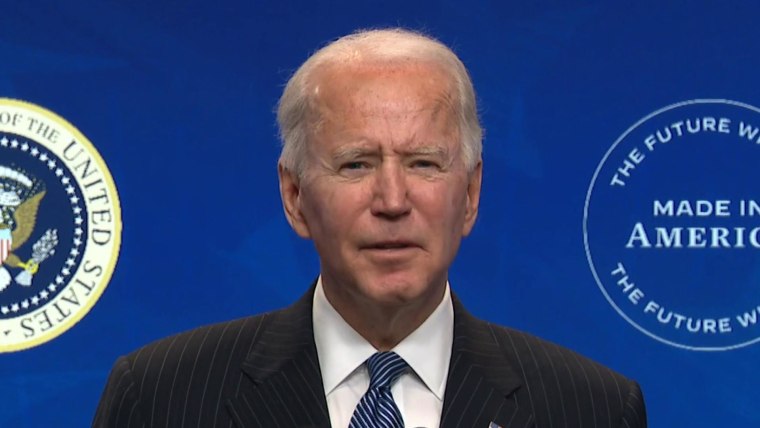Little-organization owners welcome Biden’s order to ‘Buy American’
Many smaller-enterprise proprietors — particularly those with govt contracts — celebrated Monday’s news that President Joe Biden had signed laws to tighten the “Obtain American Act.”
“In a extremely brief time, you will find been a much a lot more obvious concept currently being sent and a much better level of assist,” explained Marisa Fumei-Smith, president of the textile maker Two A person Two New York, which made apparel and knitwear but has pivoted to make own protecting devices for community authorities agencies and organizations.
The enterprise has developed from 60 staff at the start of the pandemic to about 400, together with subcontractors that operate completely for Two A single Two.
The act demands firms that acknowledge federal contracts to be centered absolutely in the U.S. and to source none of their provide chains internationally. It also raises the load of evidence for enterprises to argue that sourcing products and solutions domestically is way too costly, and most crucial, it establishes an oversight business office.
Determined situations
Even before the coronavirus pandemic, the industry was in crisis for the reason that of a continuous decrease in U.S.-dependent manufacturing positions and lax benchmarks requiring providers to generate locally. The Bureau of Labor Stats estimates that at least 7.5 million producing work have been misplaced considering the fact that 1980.
“There was a second in time when every single one of your shoppers mentioned if you do not transfer your organization to China, you happen to be not likely to have any enterprise with us,” claimed James Wyner, CEO of Shawmut Corp., a textile producer with headquarters in West Bridgewater, Massachusetts, whose spouse and children has run the corporation for four generations. Despite the fact that Shawmut has workforce around the environment, it falls within the federal modest business classification for the textile finishing sector.
But the pandemic has exposed the vulnerability of worldwide offer chains. Shortages of protective devices across the nation had been starkly illustrated by pictures of nurses utilizing trash luggage as coverings. When Covid-19 struck, numerous textile suppliers experienced the prospect to get govt contracts for the initially time to make protective tools.
Gabrielle Ferrara, chief functioning officer of Ferrara Producing of New York, had labored with the designers Ralph Lauren, Calvin Klein and Donna Karan to make personalized garments ahead of the pandemic. When the enterprise shifted to building masks and isolation gowns, she initially experienced to resource products from countries like China. “That network and all those associations didn’t exist, and very frankly, the producing traces failed to exist,” she said.
Via the pandemic, she began to perform with greater organizations, like DuPont and Parkdale Mills, a single of the premier cotton producers in the earth, to source material domestically.
“It can be a lot more than just a seller-material romantic relationship,” she claimed. “You will find a real feeling of local community and an excitement about Designed in United states of america product.”
Throughout the pandemic, getting domestic offer chains has been a boon for textile suppliers, producing them suitable for new authorities contracts. Two One particular Two linked with a contractor for the Federal Emergency Administration Company by means of an business get in touch with who understood its manufacturing was entirely domestic, Fumei-Smith reported.
“Just about every element desires to be U.S.-sourced,” Fumei-Smith claimed about the federal grant specifications. “Your fabric, your threads, any trimmings, down to the poly bags. Any stickers, labels, cartons, pallets. Each single component.”
In the first 10 months of the pandemic, the business delivered 5 million masks. Protecting gear has turn into a permanent division of the business, she mentioned. It has expanded to make isolation gowns, booties, bouffants, sleeve gaiters, aprons and individual blankets.
Cautious optimism
Some textile suppliers are nonetheless involved that Biden’s makes an attempt to boost circumstances for U.S. suppliers may possibly not be plenty of to conserve them.
Kathie Leonard, CEO of Auburn Production in Mechanic Falls, Maine, oversees the manufacturing of large-warmth materials utilized to make basic safety clothes for the automotive and shipbuilding industries. As a customer of the defense field, the company has not experienced the same spike in govt contracts as other textile brands.
“I have but to see that form of organization come to us,” she mentioned. “The industrial sector is nonetheless floundering.
“We bid on a multiyear contract that should have been awarded in Oct, and it is been extended,” she explained. The defense contracts are expensive, she stated, and when they are crucial, several have been postponed via the pandemic.
General, even so, Leonard is optimistic.
“This is likely to be a nice tiny shot in the arm, to don’t forget that we do have a large amount of personnel in this region that want to operate, that want to make matters. Let us assist them and acquire the things which is produced in this article,” she mentioned.
Hopeful potential customers
For Shaffiq Rahim, president of Hi-Tech Engineering, Buy American signifies organizations have much more aid to invest in quality. Hello-Tech, dependent in Camarillo, California, in the vicinity of Los Angeles, helps make aerospace areas for the protection field and commercial customers. Rahim explained that when potential customers determine to outsource tasks to help save revenue, 60 % of the time they come back again to Hello-Tech Engineering. He reported they typically have compensated for products that do not satisfy excellent technical specs.
Organizations also show up hopeful that Biden’s most current modifications will necessarily mean a lot more possibilities to build manufacturing employment. Wyner, of Shawmut Corp., has been performing on a agreement to restock the Strategic Countrywide Stockpile with protecting devices. He has been able to employ 550 individuals, and he employed 100 far more to assistance comprehensive the job, which ends in a couple weeks.
“We’re confronting the reality that when our deal operates out, people work opportunities are probably to go away,” he explained. “We want these employment to continue to be.”








